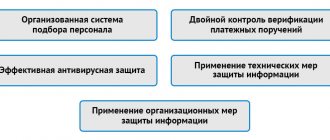What to do if money is stolen from your card via the Internet?
In accordance with the current legislation of the Russian Federation, the bank is obliged to return the money to the cardholder if:
- the holder did not violate the rules for safe use of the card;
- the cardholder informed the bank about the unauthorized transaction as soon as possible (no more than one day from the date of receipt of the transaction notification from the bank).
It should be understood that it is impossible to cancel the operation itself, but it is possible to return the funds withdrawn from the account. To do this you need:
- If you discover theft of funds from a bank card, immediately report the theft to the bank and request that the card be blocked . You can block the card yourself via the Internet system or mobile application. Sometimes this is faster than calling a call center operator. However, it is still necessary to report the incident to the contact line operator.
- immediately after calling the bank, immediately report the theft to the police by phone 02. This will record the fact that the owner of the bank card has contacted you and will complicate the attempts of unscrupulous police officers to illegally deny you the right to file a statement about the crime committed.
- no later than the next day after receiving a notification from the bank about debiting funds from the account, come to the bank branch and submit a written statement about the theft of funds from the card and blocking the account. This will increase the likelihood of successful return of funds to the victim’s account.
Commentary to Art. 159.3 Criminal Code
1. The crime is characterized by a special method of committing a crime - deception of an authorized employee of a credit, trade or other organization by using a counterfeit or a credit, payment or other payment card belonging to another person (for example, a bank card to pay for goods or services in a shopping or service center, when the person enters the PIN code, signs the purchase receipt instead of the legal card owner, or presents a fake passport in his name).
2. Authorized employees of a credit, trade or other organization include persons who are employees of the relevant organization and who actually carry out operations on behalf of the said organization for the sale of goods, payment for work (services), acceptance and issuance of funds using cash registers or banking equipment, equipped with the ability to accept payment cards for service. It does not matter whether they were appointed to their position in violation of the law or local acts of the organization. Even if the authorized employee did not take any action to identify the card owner (did not ask to sign a check, provide a passport, etc.), the action is still qualified according to the commented norm.
3. In accordance with paragraph 13 of the Resolution of the Plenum of the Supreme Court of the Russian Federation of December 27, 2007 N 51 “On judicial practice in cases of fraud, misappropriation and embezzlement”, theft of other people's funds by using a previously stolen or counterfeit credit (payment) card, if cash is issued through an ATM without the participation of an authorized employee of a credit institution, it is qualified under Art. 158 of the Criminal Code of the Russian Federation.
Help from a lawyer in case of money theft
Thus, the current legislation provides the victim with broad powers to return stolen funds, but certain gaps still remain. In this regard, it would be wise to seek help from our lawyer, who:
- will take upon himself the protection of your interests at all stages of the case;
- will submit a written statement about the incident to law enforcement agencies (for more information about the application to initiate a criminal case for fraud, follow the link), bank, insurance company;
- will challenge the slightest violations of the norms of the criminal procedure code and the actions of the investigator;
- collect the required evidence;
- will draw up and file a civil claim in a criminal case if the culprit has not been found;
- will receive a copy of the writ of execution and will appeal against the actions or inaction of the bailiff.
You can contact our lawyer at any stage of the case, but the sooner you do this, the better!!!
Don't look for the owner
The hassle of re-issuing a bank card is not your problem. A noble impulse to return something lost can turn against you.
Let's say you found a card holder through social networks (lucky - a rare first and last name). But in a personal meeting, instead of a “thank you,” you can get accused of theft. Under the psychological pressure of a fraudster, it is really easy to believe that N rubles have disappeared from the account and take money out of your pocket.
Posting ads on the Internet is also a bad idea. If the card is not yet blocked, fraudsters can use its details.
Anastasia Loktionova
Deputy General Director of Rusmikrofinance
There is a life hack circulating on the Internet where they transfer the minimum amount to a found card and in the comments ask the owner to contact the sender. There is nothing illegal about this, because you are not withdrawing, but depositing money. But you also need to be careful, people are different. This method is possible if you found a card somewhere in the office or at the entrance of your house. Probably one of her colleagues or neighbors lost it.
Protection of the victim in case of theft from his bank card or account
As practice shows, despite compliance with all the above recommendations, the victim - the card holder often has to independently prove the fact of theft of funds from a bank account. Evidence may include witness statements, the behavior of the victim himself, recordings from video cameras and video recorders, etc. In addition, it is necessary to prove the fact that the injured party has stolen amounts, which can be confirmed by providing certificates from the place of work about income, a loan agreement, etc.
The very fact of initiating a criminal case already indicates that you are a bona fide user who does not abuse the right, and that illegal actions were actually committed against you. This type of crime falls into the category of minor and medium gravity. The qualification of the case depends on the specific circumstances of the incident. If the stolen funds are not returned by the bank, the injured party may, within the framework of a criminal case against the suspect, file a civil claim, which will be considered when the court pronounces a verdict. Based on the verdict, the victim receives a writ of execution to present it to the bailiff service for the purpose of forced recovery of stolen funds.
USEFUL : watch the VIDEO with advice from a criminal lawyer regarding protecting the victim from a crime and write your question in the comments of the video
In what other cases can the bank block the card and account?
The bank has the right to suspend transactions, as well as seize money in the bank account, based on relevant decisions of government bodies or officials.
Seizure may be imposed by courts and bailiffs on the basis of relevant acts and resolutions. These include decisions on non-payment of alimony, non-payment of taxes, debts to third parties, fines, and so on.
All bank clients have the right to receive an explanation of why a payment card was blocked or a bank account was seized.
To do this, you need to contact the bank, and if you have doubts about the legality of its actions, you can apply for protection of your rights and interests to the Agency of the Republic of Kazakhstan for Regulation and Development of the Financial Market.
How to write a statement about the theft of money from a card?
An application for theft of money from a card is submitted to several authorities at the same time. This must be done as quickly as possible - no later than the day following the day the funds are written off from the account, since in accordance with the Law of the Russian Federation “On the Protection of Consumer Rights”, the time frame for satisfying individual requirements is no more than 10 calendar days from the date of receipt of the corresponding application. Moreover, in accordance with the Law “On Banking Activities”, a financial organization is given 30 calendar days to consider a received claim. In other words, the bank can satisfy your request for a refund either the next day or a month later.
- A statement to the police about the theft of money from a card is submitted with the aim of initiating a criminal case for the theft of money (Article 158 of the Criminal Code of the Russian Federation) or for fraud (Article 159.3 of the Criminal Code of the Russian Federation). To file a statement about the incident, you must contact the nearest police station or call 02. In the application, you must indicate all the circumstances of the incident, attach copies of available documents (bank account agreement and all attachments to it, account statement certified by the bank’s seal, etc. .). The fact of filing a statement of theft with the police is confirmed by a coupon notification of acceptance of the written statement, issued to the victim.
- An application to the bank for the return of funds is drawn up in two copies and submitted in writing to the head of the financial institution in accordance with the requirements of the federal law “On the National Payment System”. The application must indicate the full name of the card holder, its number, location of the transaction, date, amount, currency, actions taken, and also confirm the controversial transaction with a card statement. Attached to the application to the bank is a notification coupon received from the police regarding the acceptance of an application for theft of funds from a bank card.
- Application to the insurance company about an insured event . A number of banks offer insurance services for funds on the card, which is a kind of guarantee of the safety of money. The insurance policy for bank cards assumes the possibility of recourse within two days after the theft of funds from the holder’s card. Only under such conditions the insurer considers the incident and makes a payment. You must report the occurrence of an insured event - theft of money from a card - by calling the insurer's contact center specified in the insurance policy within 12 hours after discovering the incident. In this case, you will also need to collect supporting documentation provided for by the insurance rules and write a statement in two copies about the occurrence of an insured event, similar to a statement about the theft of funds to a bank.
ADVICE OF A LAWYER : When accepting an application, a bank employee must put a mark on the applicant’s copy indicating acceptance of the application, indicating the date and time of its acceptance.
What is card blocking?
Please note that the concept of “blocking” within the framework of Kazakhstani legislation is used only in relation to payment cards. This is a ban on carrying out transactions using them, including paying for goods and withdrawing cash.
The legislation also does not have a separate concept of “card account”, and a payment card is an instrument that gives access to its holder’s regular bank account.
Cases in which the bank that issued the card blocks it are recorded in the Rules for issuing payment cards, as well as the requirements for activities for servicing transactions using them in Kazakhstan.
They clearly state that the bank is blocking the card:
- upon receipt of notification from its holder about the loss, theft or unauthorized use of a payment card;
- if the holder fails to fulfill the agreement on issuing a payment card;
- in case of non-compliance with the internal document for using a payment card, stipulated by the agreement between the issuer and the holder.
The conditions for blocking a card, in particular, the procedure, methods and cases of sending notifications by the bank to the client, are stipulated in the agreement on its issue.
Illustrative photo: NUR.KZ / Petr Karandashov
Defense of the accused by a lawyer involving theft of money from a card
You can use the services of our lawyers in the case where you were accused of stealing money from a bank card without presenting any evidence. Unfortunately, today this is not uncommon and anyone can encounter a similar situation, so it is important to know what to do in such cases.
The grounds for bringing charges of stealing money from a card may include:
- witness's testimonies;
- recordings from CCTV cameras;
- personal belongings of the accused found at the crime scene, etc.
Citizens who file a complaint with the police without reason may be subject to criminal liability for intentional slander (Article 306 of the Criminal Code of the Russian Federation).
If you are accused of stealing money from a card that you did not commit, you have the right to:
- call police officers to the crime scene;
- seek help from our criminal lawyer;
- submit an application under Article 129 of the Criminal Code of the Russian Federation “Slander”;
- file a claim for protection of honor, dignity and business reputation under civil law (
if the ATM cost less than 2,000 rubles
The assistance of a professional lawyer significantly increases the likelihood of a positive outcome of the case.
if the ATM cost less than 2,000 rubles, then such an act can be recognized not as theft, but as petty theft, and then it falls under the Code of Administrative Offenses of the Russian Federation, which does not entail a criminal record.
In this case, the decisive factor is whether related actions were committed that entail criminal liability, regardless of the value of the ATM. For a list of such actions, see this link.
Administrative liability for ATM theft
For the theft of an ATM worth up to 1,000 rubles, the following liability is provided:
- a fine in the amount of up to five times the value of the stolen property, but not less than one thousand rubles;
- or administrative arrest for up to fifteen days;
- or compulsory work for up to fifty hours.
For the theft of an ATM worth from 1000 to 2000 rubles, the following liability is provided:
- a fine in the amount of up to five times the value of the stolen property, but not less than three thousand rubles;
- or administrative arrest for a period of ten to fifteen days;
- or compulsory work for a period of up to one hundred and twenty hours.
Legislative regulation
Article 7.27 of the Code of Administrative Offenses of the Russian Federation, petty theft (version current for 2021)
1. Petty theft of someone else’s property, the value of which does not exceed one thousand rubles, by theft, fraud, misappropriation or embezzlement in the absence of signs of crimes provided for in parts two, three and four of Article 158, Article 158.1, parts two, three and four of Article 159, parts two, three and four of Article 159.1, parts two, three and four of Article 159.2, parts two, three and four of Article 159.3, parts two, three and four of Article 159.5, parts two, three and four of Article 159.6 and parts of the second and third of Article 160 of the Criminal Code of the Russian Federation, with the exception of cases provided for in Article 14.15.3 of this Code - (as amended by Federal Law dated 02/05/2018 N 13-FZ)
punishment: entails the imposition of an administrative fine in the amount of up to five times the value of the stolen property, but not less than one thousand rubles, or administrative arrest for up to fifteen days, or compulsory labor for up to fifty hours.
2. Petty theft of someone else’s property worth more than one thousand rubles, but not more than two thousand five hundred rubles through theft, fraud, misappropriation or embezzlement in the absence of signs of crimes provided for in parts two, three and four of Article 158, Article 158.1, parts two, three and fourth article 159, parts two, third and fourth of article 159.1, parts second, third and fourth of article 159.2, parts second, third and fourth of article 159.3, parts second, third and fourth of article 159.5, parts second, third and fourth of article 159.6 and parts the second and third articles 160 of the Criminal Code of the Russian Federation, with the exception of cases provided for in Article 14.15.3 of this Code - (as amended by Federal Law dated 02/05/2018 N 13-FZ)
punishment: entails the imposition of an administrative fine in the amount of up to five times the value of the stolen property, but not less than three thousand rubles, or administrative arrest for a period of ten to fifteen days, or compulsory labor for a period of up to one hundred and twenty hours.







